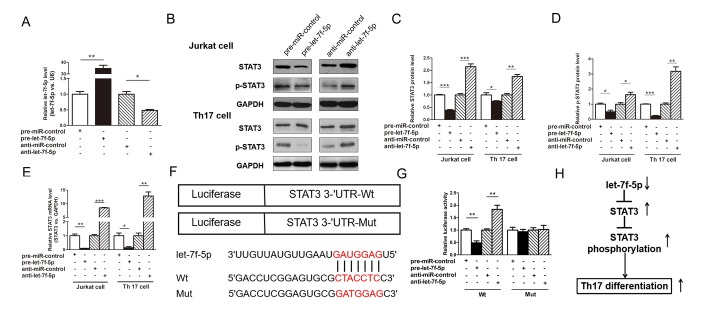Figure 5.
STAT3 is a direct target of let-7f-5p. (A) RT-PCR analysis of the expression of let-7f-5p in Jurkat cells transfected with 100 pmol of pre-let-7f-5p, anti-let-7f-5p or negative control RNA. (B) Western blotting analysis to detect STAT3 and p-STAT3 protein levels in Jurkat cells and induced mouse Th17 cells (Th17 cell) transfected with 100 pmol of the pre-let-7f-5p, anti-let-7f-5p or negative control RNA. (B): representative image; (C, D) quantitative analysis. (E) RT-PCR analysis of STAT3 mRNA levels in Jurkat cells and induced mouse Th17 cells transfected with 100 pmol of the pre-let-7f-5p, anti-let-7f-5p or negative control RNA. (F) Luciferase plasmids contain the wild-type (Wt) and mutant 3’-UTR of STAT3 and sequences of Wt and Mut target sites for let-7f-5p in the 3’-UTR of STAT3 are shown. (G) Dual luciferase reporter assay was used to confirm the direct recognition of the STAT3 3’-UTR by let-7f-5p. Wt and Mut luciferase plasmids were cotransfected into 293T cells with 100 pmol of pre-let-7f-5p, anti-let-7f-5p or negative control RNA. The β-galactosidase (β-gal) expression plasmid was used as a transfection control. (H) The working model of the role of let-7f-5p in Th17 differentiation. (* p < 0.05; ** p < 0.01; *** p < 0.001)

